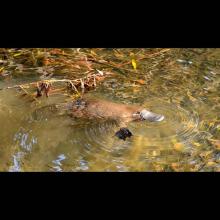Ornithorhynchus anatinus
Common name:
Duck-billed platypus
Suborder:
-n/a-
Order:
Monotremata
Class:
Mammalia
Ornithorhynchus anatinus
Common name:
Duck-billed platypus
Suborder:
-n/a-
Order:
Monotremata
Class:
Mammalia
Ornithorhynchus anatinus
Common name:
Duck-billed platypus
Suborder:
-n/a-
Order:
Monotremata
Class:
Mammalia
Order (Animalia): Monotremata
Monotremes (/ˈmɒnətriːmz/, from Greek μονός, monos ('single') and τρῆμα, trema ('hole'), referring to the cloaca) are one of the three main groups of living mammals, along with placentals (Eutheria) and marsupials (Metatheria). The monotremes are typified by structural differences in their brains, jaws, digestive tract, reproductive tract, and other body parts compared to the more common mammalian types. In addition, they lay eggs rather than bearing live young, but like all mammals, the female monotremes nurse their young with milk.
Monotremes are traditionally referred to as the mammalian subclass Prototheria. The only surviving examples of monotremes are all indigenous to Australia and New Guinea although there is evidence that they were once more widespread including some extinct species in South America. The extant monotreme species are the platypus and four species of echidnas. There is currently some debate regarding monotreme taxonomy.
Reference: Wikipedia

